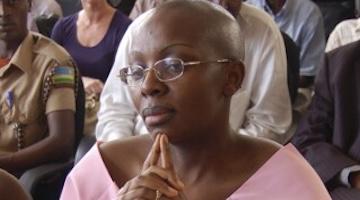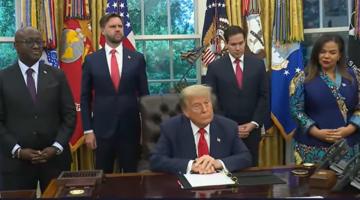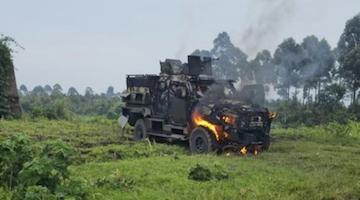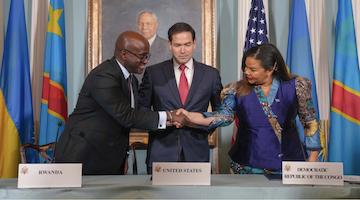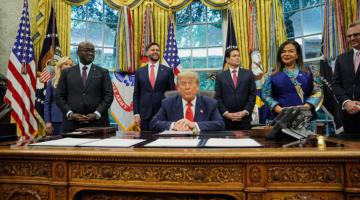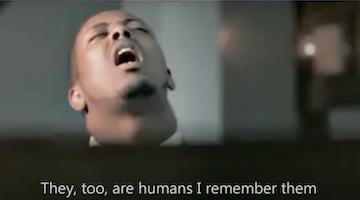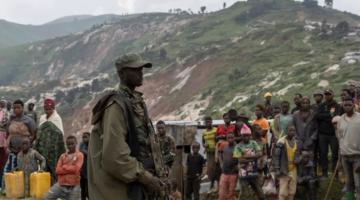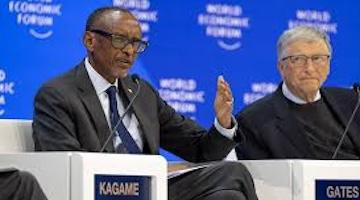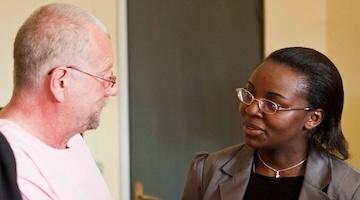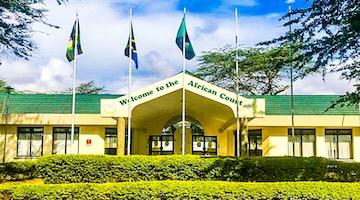Since the 1998 invasion of the Congo 5.4 million congolese have perished so the west could access their country's mineral wealth.
It's Congo Genocide Week, the anniversary of the 1998 invasion of the Congo by the US puppet armies of Rwanda and Uganda. Since then 5.4 million Congolese have perished. Africa reporter Ann Garrison talks to Sylvestre Mido of Genecost about the invasion and its consequences almost two decades on.
Congo Genocide: An Interview with Sylvestre Mido
by BAR contributor Ann Garrison
Genocost, a UK-based Congolese advocacy group, commemorated Congo Genocide this week on August 2nd. August 2nd is the day that US allies Rwanda and Uganda invaded the Democratic Republic of the Congo, starting the Second Congo War in 1998. Though a peace treaty was signed in 2003, the violence, displacement, and mass killing continue. War epidemiologists working with the International Rescue Committee estimated the death toll at 5.4 million during just 10 years of the nearly 20-year old conflict.
Genocost asks that nations formally recognize August 2nd as Congo Genocide Commemoration Day. I spoke to Genocost spokesperson Sylvester Mido, a Congolese British IT professional and activist. His family fled Congo in 1999, when he was 16 years old.
Ann Garrison: Sylvester, why does your group want to “commemorate” a genocide that is ongoing? Aren’t genocides and other tragedies usually commemorated in retrospect?
Sylvestre Mido: We want to commemorate the genocide in Congo because Congo has a history filled with forgotten tragedies.There are no commemorations for the 10 million Congolese killed under Belgium’s King Leopold II’s reign of terror. King Leopold II wiped out half our population at that time—over a century ago—for the sake of rubber, ivory, and gold.
In other nations, monuments would be built to such a tragedy, books would be written about it, and its history would be taught in schools. But in our schools we were taught that Leopold II was our “Builder King.” We were told of how he helped build our nation by building roads and infrastructure. The man is still sold to Congolese children almost as a “savior” of our nation. To this date, many Congolese at home still refer to him and the other Belgian colonizers as Nokos (Maternal Uncles).
Only after moving to the UK did I discover the true story of Leopold in the BBC documentary “White King, Red Rubber, Black Death.”
AG: OK, hold on because my jaw just hit the floor. You’re telling me that you went to school in Congo, and they told you about the glorious King Leopold without telling you that he wiped out half the population?
SM: Yes.
AG: They did not tell you that?
SM: No.
AG: Is that true across the Congolese school system?
SM: As far as I am aware that is the general situation. To this day, Congo teaches the Belgian curriculum left after colonization.
AG: So what did you do after you saw “White King, Red Rubber, Black Death”?
SM: Discovering the true story of Leopold II made me realize how important it is for us as a nation to be able to learn and tell our own story and to pass it to the next generation in the hope that they will not suffer as past generations did. Today Congo is reliving almost exactly the same inhumane exploitation as it did under Leopold—the systematic killing and enslavement of Congolese for their resources. So we decided to begin with commemoration of the date it began. August 2nd is the anniversary of the beginning of the Second Congo War, so we commemorate it to remind Congolese communities at home and abroad that since that date, millions of Congolese have been killed, raped, kidnapped, and enslaved for our natural resources. We need to remember them and work to bring an end to the killing.
AG: I assume you’d also like the rest of us to acknowledge the killing and work to stop it?
SM: Yes. We do want our friends all over the world to stand with us and help us end the killing.
Congo has so much to offer to the world. It's a country of incredible beauty, whose wealth stretches far beyond its mineral resources. Congo is home to one of the world’s largest rainforests, second only to the Amazon’s, and that means it’s a huge part of the planet’s lungs. Rampant timber exploitation and deforestation is destroying not only our forest people but also the global climate.
We are known for our warmth, our vibrant culture, and our music and arts and we’d like to share all this beauty with the rest of the world, but as long as the violence continues, we are losing not only our people, but also our culture, our environment, our wildlife, and our chance to join in preventing climate catastrophe.
So we are asking people around the world to join us in the struggle.
AG: Could you talk about how Jeremy Corbyn has supported you?
SM: I met Jeremy Corbyn on Christmas Eve 2011, when I was standing outside 10 Downing Street in the cold and rain with thousands of Congolese protesting the rigged Congolese election. An old man showed up and said he'd like to have a word with us, and the elders said, "Let him speak; he's the MP of Islington," which has a large Congolese community. That was Jeremy Corbyn, and he told us that he'd been to Congo, he understood what's going on there, and he wanted to urge us to continue our struggle because it needs much more of the world's attention. So I'm surprised and happy that, six years later, Jeremy Corbyn leads the Labour Party and has a good chance of becoming Prime Minister.
And he didn’t just talk. After that he asked Parliament to pass a motion saying that the 2011 election results were not credible.
AG: I looked up the Corbyn motion—submitted on December 12, 2011—while we were talking. Nineteen Labour Party members voted for it, as did seven members of the Liberal Democrats, and one member each of the Conservatives, the Democratic Unionists, Plaid Cymru, and the Greens. Caroline Lucas is the only Green in the UK Parliament, so, as a US and Global Green, I’m glad to see that my party supported the motion 100%. However, all those votes added up to only 30 of the 650 Members of Parliament in the House of Commons.
SM: Yes, but it was still significant that Jeremy Corbyn made them hear our case and they gave us even that much support.
AG: And this is particularly important because the US and the UK are the most influential big powers in Congo and the African Great Lakes Region, right?
SM: Yes, the UK and the US are the largest bilateral donors to both Congo and Rwanda, so I believe that having someone like Jeremy Corbyn in power could bring a positive change. I'm not under any illusion that his election alone will be enough to end the genocide. An army of multinational corporations and various lobbies would be fighting him. But it would send a strong signal to Rwanda’s Paul Kagame and all the other dictators and warlords wreaking havoc in the Congo and the Great Lakes Region. It would let them know that their usual allies, including Tony and Cherie Blair, are no longer in charge and will not be able to protect them much longer.
AG: Some writers and scholars have said that the word genocide is so overused and politically abused that they no longer use it, or use it only rarely. They include Professor Edward S. Herman and David Peterson, co-authors of “The Politics of Genocide,” and Noam Chomsky, who wrote the introduction to that book. I agree with them, but this is your story, so tell me why you and your group think it’s important to claim the word “genocide”?
SM: Article II of the UN Convention on Genocide defines the crime in 5 ways:
(a) Killing members of the group;
(b) Causing serious bodily or mental harm to members of the group;
(c) Deliberately inflicting on the group conditions of life calculated to bring about its physical destruction in whole or in part;
(d) Imposing measures intended to prevent births within the group; or,
(e) Forcibly transferring children of the group to another group.
All of these criteria are met in Congo. Congolese are systematically killed. Children are taken away from their families to be trained as child soldiers or to be used as slaves in mines. Women are systematically raped, separated from their community and left living with sexually transmitted disease. We have entire generations affected by that.
Each one of those harmful acts inflicted on the Congolese people fits the definition of genocide on its own. But when you have all five of them happening in one place, you can no longer say that this is not a genocide. Genocide is what is happening in Congo. It’s what has been happening for the last nearly 20 years. It’s a systematic killing. It’s a sustained killing. It’s a killing that is driven by the need to be making profit, and the demand for copper, coltan, and other mineral resources that the Congolese have.
AG: So it’s planned and systematic—to separate people from their land and resources.
SM: Yes, that’s exactly what it is.
AG: Other international crimes that are not in the UN Convention on Genocide have also been committed in Congo. They were established by the United Nations’ International Law Commission to codify the legal principles underlying the Nuremberg Trials of Nazi party members following World War II. The first of these is:
“Crimes against peace: (i) Planning, preparation, initiation or waging of a war of aggression or a war in violation of international treaties, agreements or assurances;
(ii) Participation in a common plan or conspiracy for the accomplishment of any of the acts mentioned under (i).”
Rwanda and Uganda have both repeatedly violated this first principle of international law by repeatedly invading Congo. They’ve also committed war crimes and crimes against humanity as defined in the rest of the Nuremberg Principles:
(b) War crimes: Violations of the laws or customs of war which include, but are not limited to, murder, ill treatment or deportation to slave-labour or for any other purpose of civilian population of or in occupied territory, murder or ill-treatment of prisoners of war, of persons on the seas, killing of hostages, plunder of public or private property, wanton destruction of cities, towns, or villages, or devastation not justified by military necessity.
(c) Crimes against humanity: Murder, extermination, enslavement, deportation and other inhuman acts done against any civilian population, or persecutions on political, racial or religious grounds, when such acts are done or such persecutions are carried on in execution of or in connection with any crime against peace or any war crime.
It can be argued that the UN Convention on Genocide includes most of those crimes in far more general description, but one crime that it does not include is “plunder of public or private property.” So do you think your group might add violation of the Nuremberg Principles to your list of crimes committed in Congo?
SM: Those principles you've highlighted have been violated countless times by armies of Rwanda and Uganda in Congo. One of the worst instances that comes to mind is the six days of war in Kisangani during which Ugandan and Rwandan troops fought each other for mineral treasure on Congolese soil. They destroyed a whole city filled with civilians.
We could well add those to the list of crimes committed during this conflict, but for the time being, we want to focus people’s attention on the bigger picture by asking them to acknowledge the genocide. That is, however, something that the UN and the "international community" aren’t likely to do unless and until it serves their interests.
Most Congo campaign groups focus on lobbying the UN and other political structures to acknowledge what is happening in Congo and doing something about it. We have nothing against that, but we believe that it is equally if not more important to gain the support of the Congolese people themselves. Once a nation takes a stand and makes it clear to the world that it will not settle for anything less than justice, it becomes difficult for anyone wanting to deal with us in the future to continue their abuse and aggression. Once we acknowledge what we have gone through, it becomes difficult for others to dismiss it, and that is what we are working toward. Self-determination.
AG: OK, let me ask a few final questions about Rwanda’s occupation of Congo. In his new book “Kagame’s Killing Fields,” David Himbara writes, “By 1997, Kagame had become the predominant occupying power in DRC [the Democratic Republic of the Congo], a vast country ninety times larger than Rwanda.” Would you describe this as an ongoing occupation?
SM: Kagame's Influence in DRC is not really a secret to anyone. He may well deny it, but the sudden rise of Rwandophone Congolese in key roles in the Congolese government and the Congolese army is not a coincidence. Rwandan rebel groups like the M23, which was notorious for committing atrocities in Congo, continually flow back and forth between the Congo/Rwanda border. They simply "disappear" back into Rwanda when it serves them.
AG: Do you think this ongoing occupation could be sustained without the assistance of military powers more formidable than Rwanda?
SM: No. It would be ridiculous to assume that in today’s world, Rwanda could militarily occupy a nation the size of Congo on its own. Even the Kivu Provinces alone have proven to be too big a challenge. Those hoping to balkanize Congo by splitting off the mineral rich Kivu Provinces have failed despite many years trying.
Rwanda has succeeded in getting as far as it has because it has been backed by superpowers whose corporations benefit from all the minerals smuggling. Those are the same superpowers that have sold weapons to militias on both sides of the Congo/Rwanda border for the last 20 years. They continue to fuel this conflict, which has proven to be a very profitable business in more ways than one.

